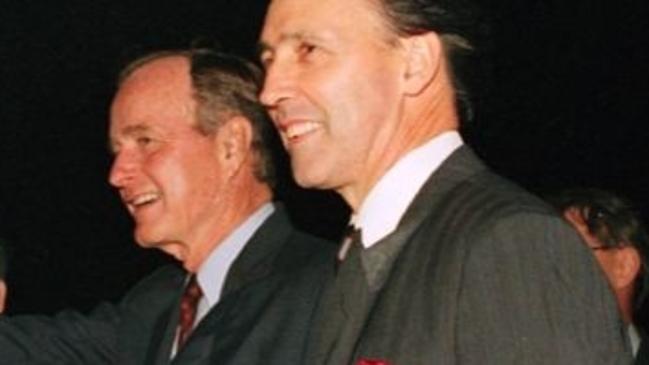Cabinet papers 1992-93: Keating questioned future of US alliance
The US risked being ‘gradually left behind’ in the Asia-Pacific, Paul Keating warned George HW Bush.

The US risked being “gradually left behind” if it did not exercise new leadership in the Asia-Pacific, Paul Keating warned George HW Bush in a historic meeting of the two leaders on New Year’s Day in 1992 — foreshadowing the challenges the US now faces to maintain its influence in the region.
In private notes before the Kirribilli House meeting, provided to The Australian, the former prime minister questioned the value of maintaining the Australia-US alliance and saw a regional leaders’ meeting as the key to reinvigorating the relationship between the US and the Asia-Pacific in the post-Cold War era.
When Bush met the cabinet in Canberra on January 2, 1992, he felt the need to emphasise that the US was not “neglecting Asia and Australia” and stressed that the US “intended to stay fully involved, in both an economic and a security sense” in the region.
Yet as Keating prepared for the first meeting between a prime minister and a US president in Australia since 1967, his handwritten notes of discussions with officials reveal a leader in the throes of reassessing the alliance and the broader Australia-US relationship.
“What is the ongoing validity of the Australia-US alliance?” Keating asked during a meeting with public servants at Parliament House. “Who are we allied against? ANZUS (was) never specifically directed against any particular country.”
Keating’s notes — provided to The Australian to coincide with the release by the National Archives yesterday of the 1992 and 1993 cabinet papers — reflect his long-held view that Australia had often been too compliant towards the US and should embrace a more independent outlook that better balanced strategic and economic priorities.
Was the alliance to be used “against China” or “against a resurgent Japan” he queried? “Does the US administration/congress still regard the commitments on the alliance as valid”?
He added: “Do we want Japan to have a larger defence role or is this just asking for trouble?”
“From our side — as shown by our participation in the Gulf War — we see ourselves allied to you,” he planned to tell Bush.
“But not by virtue of the ANZUS treaty — which is a Pacific area treaty.”
Keating concluded: “Ultimately, we will have to decide our own interests as they will their side.”
His notes, written on December 28-29, 1991, also reflect the uncertainties of the post-Cold War world. The Soviet Union had been dissolved just a week earlier. The Berlin Wall had tumbled in 1989. The US was finalising withdrawal of its navy from Subic Bay in The Philippines and was concluding the North American Free Trade Agreement negotiations.
Keating was sworn in as prime minister just 10 days before the US president’s arrival in Sydney.
He envisioned an opportunity for “a more sophisticated foreign policy” in the Asia-Pacific region that embraced “open regionalism and multilateralism” based on shared economic and strategic interests.
“We welcome US involvement in the security issues of the western Pacific,” Keating wrote on a notepad.
Yet he was concerned about trade blocs developing in the Americas and in Europe, following the stalled General Agreement on Tariffs and Trade negotiations that would benefit Australia.
“Does the US have the economic wherewithal to sustain a credible long-term posture in its western Pacific?” his notes ask.
Keating would urge Bush to have “an Asia policy” rather than adopt “bilateralism” with individual countries.
He referred to US policy in the region as “the fan and spokes” approach.
He would explain to Bush that the region should be seen as a “fabric or mesh” where countries had stronger interlinkages.
When Keating met Bush for formal talks, he was ready to outline to the US president a grand plan to reinvigorate the political and economic architecture of the Asia-Pacific.
“US has to get into the institution-building in its Pacific area,” he wrote.
“Perhaps a summit meeting of the 15 nations of APEC?”
Keating wasted little time in making the case for a new regional body. “Leadership (is) currently a scarce commodity in the world,” he told Bush.
“It (is) important for the US to hold its position. Having won the ideological struggle against the Soviet Union, it (is) now in an unparalleled position of international leadership.
“There (is) a need to develop stronger economic institutions in the Asia-Pacific region. APEC (is) the natural forum in this regard.” The Asia-Pacific Economic Co-operation forum was a ministerial-level multilateral trading forum.
“To strengthen APEC it (is) worth considering holding occasional meetings at the head-of-government level,” Keating said.
“That would be a way for the US president to demonstrate very clearly that the US was engaged in the Pacific, not only in bilateral relations and not only in defence relations but in an increasingly important regional economic process.”
GRAPHIC: Events of 1992 and 1993
Bush, somewhat surprised, acknowledged the US needed to “emphasise more its commitment” to the Asia-Pacific. He suggested Keating take the lead and try to corral support from other nations for his elevated APEC proposal.
Keating soon began a round-robin of meetings, phone calls and letters to persuade other nations to back his idea for a new regional leadership meeting.
The response from Indonesia, Japan, China, South Korea and Singapore was especially encouraging.
In November 1992, however, Bush was defeated in the US presidential election by Bill Clinton. In February 1993, Keating wrote to Clinton outlining his hope of turning APEC into a “periodic” meeting of regional leaders.
After Keating continued to push the idea with other regional leaders, and convinced Clinton to make the idea his own initiative, the president invited the 15 APEC leaders to a meeting in Seattle in November 1993.
When the leaders agreed to support “a community of Asia-Pacific economies”, Keating felt vindicated.










To join the conversation, please log in. Don't have an account? Register
Join the conversation, you are commenting as Logout